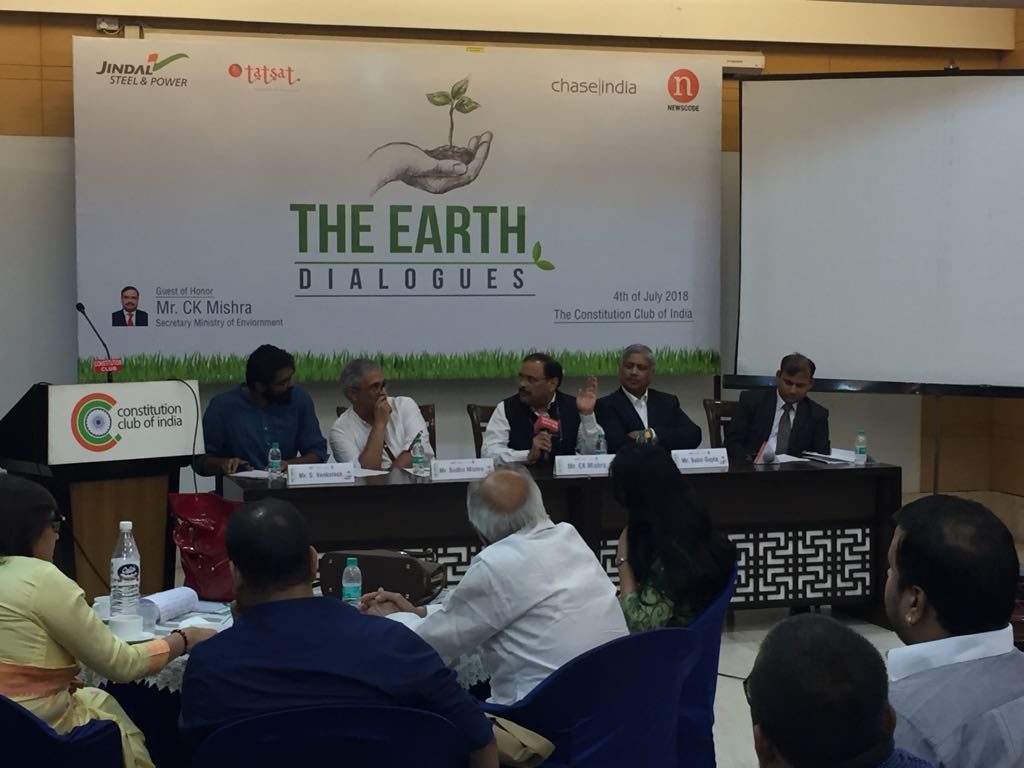New Delhi: First edition of ‘The Earth Dialogues’ was held in the national capital, as part of a series of events covering compelling themes around environmental protection. In the backdrop of India having displayed a keen desire to play a constructive role in combating the threat of climate, the discussions pointed to UN Environment Emissions Gap Report of 2017 and complexities faced by India as a developing country which remains highly vulnerable to increased risks of greenhouse emissions.
The panellists discussed the policy, implementation and economic aspects of greenhouse gas emission reduction strategies, pointing to US withdrawal from Paris Agreement that has created new challenges on the global front, and therefore a need emerges for India to reconsider its Nationally Determined Contributions (NDCs) presented to the UNFCC.
The discussion saw participation from a range of industry experts and policymakers which included Mr. C K Mishra, Secretary, Ministry of Environment, Forest and Climate Change, Mr. Naveen Khandelwal, Chief Investment & Strategy Officer, Hero Future, Mr. Sudhir Mishra, Founder and Managing Partner, Trust Legal and Mr. Subir Gupta, Founding Partner, Sustainability Advisors.
When asked about the key challenges India faces in direction of reducing emissions, Mr C K Mishra, Secretary, Ministry of Environment, Forest and Climate Change said: “India will have to remain cognizant of its developmental imperatives while keeping sight of the ambitious NDCs, but we should get there. Our development imperatives make this target much more challenging. Another major aspect revolves around the mix of power. A 40% target for renewables in the energy mix may be a touch and go but will be certainly close in and it will bring down the emissions norms. However, bringing down CO2 is not something we may achieve in 4 or 5 years. It is a fairly long and would require large-scale greening. Availability of Technology and Finance will remain a key towards this. The technology transfer from developed countries is not seamless and there is still lack of availability of new finance.”
Mr Sudhir Mishra, Founder and Managing Partner, Trust Legal spoke on the legal interpretation and effectiveness of the Paris agreement. He also threw light on the robustness of the Indian legislation to deal with the legal requirements of climate action and legal recourse options to ensure that both private and government entities are taking right steps to prioritize environmental concerns during the course of law enforcement. He said “The National Green Tribunal may be effective in giving compensations for flouted environmental norms, but it is the individual responsibility towards the environment, and not just the government. The sentiment for ecosystem and conservation is lacking. Unless we develop this sense, it will remain challenging to implement the law or policies encouraging lower emissions”
Mr Subir Gupta further opined that private sector will play a crucial role in bringing down the emissions and it should come out with its own set of commitment. He stated that “We see a distinct change in the way business is being done. Businesses now clearly see the need for taking sustainability, and believe it is imperative to viability.”
Mr Naveen Khandelwal, Chief Investment & Strategy Officer, Hero Future Energy, speaking on the at the event said, “Renewables are being accepted graciously, and a lot more capital efficiency along with technological development is happening. While today we are at 17-18 per cent of renewable in the energy mix and 40percent may be a long way to go. But there has been a great impetus driven by policies and intent from the government in the last 36 to 48 months. The cost of renewable is gradually coming down and likely to stay down permanently. India’s renewable capacity is growing at the right place. We are not making the mistakes that the US and Germany made by adding too much capacity too soon. India will have the grids ready by the time we reach our intended targets for renewables.”
The event was organized by NewsCode, a hyperlocal news platform for tier 3 and tier 4 towns and Chase India, a leading Public Policy Advocacy firm in South Asia.

















